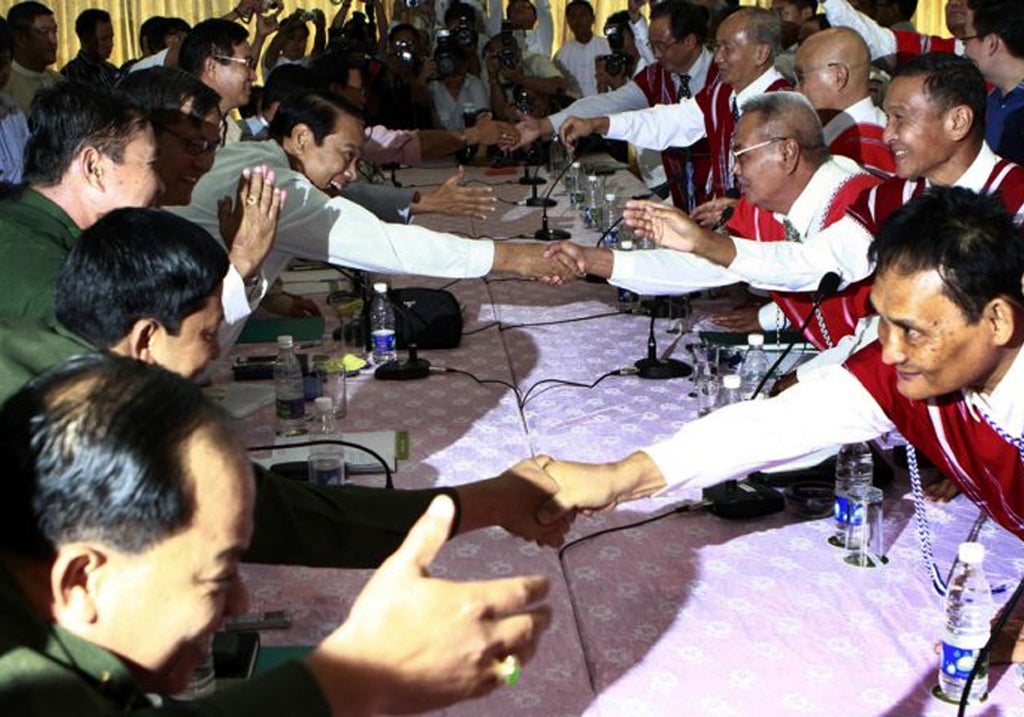End in sight for Burma's 63-year old insurgency
Government meets with Karen guerrilla leaders to end conflict and persuade the West to lift sanctions

Your support helps us to tell the story
From reproductive rights to climate change to Big Tech, The Independent is on the ground when the story is developing. Whether it's investigating the financials of Elon Musk's pro-Trump PAC or producing our latest documentary, 'The A Word', which shines a light on the American women fighting for reproductive rights, we know how important it is to parse out the facts from the messaging.
At such a critical moment in US history, we need reporters on the ground. Your donation allows us to keep sending journalists to speak to both sides of the story.
The Independent is trusted by Americans across the entire political spectrum. And unlike many other quality news outlets, we choose not to lock Americans out of our reporting and analysis with paywalls. We believe quality journalism should be available to everyone, paid for by those who can afford it.
Your support makes all the difference.Negotiators from the Burmese government and an ethnic guerrilla force have hammered out a ceasefire agreement to bring an end to what may be the world's longest-running conflict – an insurgency that has raged for 63 years.
A Burmese government minister and a 19-member delegation of the Karen National Union (KNU) yesterday reached a deal on some, if not all, of a slew of issues that have kept the two sides involved in a bloody and often brutal war.
However, there were differing reports as to whether the deal agreed in the Karen state capital of Pa-an constituted anything more than an initial pact. The government’s chief envoy, its railways minister Aung Min, told reporters that a “cease-fire agreement has been signed.” But soon afterwards, a senior KNU official, Saw David Thrac Kabaw, said that no agreement had been reached and claimed such a deal could only be signed by the Burmese president, Thein Sein.
For Thein Sein and Burma’s nominally civilian government, flush with the flurry of diplomatic attention it has received in recent months with visits from the US Secretary of State Hillary Clinton and the British Foreign Secretary William Hague, the issue of agreeing a ceasefire with various ethnic rebel armies has taken on a fresh urgency.
Several visitors, Mr Hague among them, have made clear that ending the ethnic conflicts is one of the requirements before Western sanctions against the Burmese authorities can be lifted.
“The risk is that we assume it’s all done and forget that this is only part way through,” Mr Hague said during his visit. “It’s very important that we do not relax the pressure prematurely.”
In recent months, the country’s government has held discussions with several rebel groups in an effort to forge new agreements, including the Shan, Karenni, Chin and Kachin. However, these negotiations have had differing levels of success.
In the case of the Kachin, activists say the Burmese army continues to launch intense operations despite a purported order from the centre that such action should halt. Just this week, a spokesman for the Kachin Independence Army (KIA) said a build-up of Burmese troops was ongoing.
The Karen group has been fighting for greater autonomy for more than 60 years, in a guerrilla campaign in the country’s east that dates back to before Burma’s independence in 1948.
During World War II, many Karen fighters were persuaded to join British troops in operations against Japanese forces with the promise they would win independence once the fighting was completed. But the agreement was ignored once the war ended.
Confronted by the advances of Burmese troops, who have used torture and rape as part of their operations, tens of thousands of Karen have fled into neighbouring Thailand. Today, they live in camps dotted along the Thai-Burmese border, with no legal rights in Thailand.
Zipporah Sein, general secretary of the KNU, told The Independent she believed a ceasefire had been agreed but that she had not yet received full details from the delegation.
“We are hopeful this will be the first step towards political dialogue. We can agree only if the Burmese army stops its operations against ethnic people,” she said.
Peace talks between the Karen and the Burmese authorities have been held on six earlier occasions, without securing a durable agreement.
Bertil Lintner, a regional analyst, said: “The question is, even if there is a ceasefire, how long will it last.”
Meanwhile, in a separate development, there was speculation that the government could free a number of political detainees today after Burmese state media reported that the authorities will begin releasing 651 prisoners under a new presidential pardon.
Join our commenting forum
Join thought-provoking conversations, follow other Independent readers and see their replies
Comments